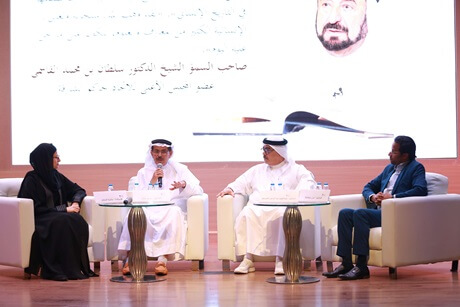The Sharjah Heritage Institute Celebrates Two Decades of Preserving Intangible Cultural Heritage
Sharjah, The Sharjah Heritage Institute marked a significant milestone by celebrating 20 years since the signing of the 2003 UNESCO agreement for the preservation of intangible cultural heritage. This celebration took place at the International Heritage Organizations Center affiliated with the Institute and featured a series of events and activities in the presence of a large gathering of heritage enthusiasts, as well as officials and employees of the Sharjah Heritage Institute.
The celebration was attended by His Excellency Dr. Abdulaziz Al Muslim, the President of the Sharjah Heritage Institute. During the event, he honored Dr. Awad Ali Saleh, a researcher and lecturer in heritage, in recognition of his outstanding contributions to the goals of the agreement over the past years and his significant impact on UNESCO's activities as a whole.
In his address at the celebration, Dr. Abdulaziz Al Muslim highlighted the pivotal role that the 2003 UNESCO agreement played in enhancing the status of living human treasures and defining elements of intangible cultural heritage for countries, showcasing them on local, regional, and international platforms.
He emphasized the substantial efforts, long series of demands, meetings, and follow-ups that were instrumental in establishing the rightful place of intangible human cultural heritage alongside tangible heritage. These efforts aimed to rectify the denigration and neglect that this heritage had suffered, despite its intrinsic value in human heritage.
Dr. Abdulaziz Al Muslim recounted the journey of efforts to restore the dignity of this human component. He noted that these efforts began in the early 1980s, offering a comprehensive and accurate picture of the struggles faced by those who carried this heritage, which is considered a valuable and authentic element in global human heritage. He commended the work of hundreds of researchers, enthusiasts, and officials who worked tirelessly to elevate the status of intangible heritage, often collaborating with various cultural and heritage institutions worldwide. Their dedication ultimately led to the signing of this important international agreement to protect intangible cultural heritage.
He also highlighted the supportive role played by the Ministry of Culture in the United Arab Emirates, which regularly sent delegations to attend preliminary meetings leading up to the agreement's signing. Dr. Abdulaziz Al Muslim personally participated in some of these meetings, recognizing the active role of Dr. Awad Saleh, who contributed and consistently attended these gatherings. These efforts culminated in the joyous signing of the agreement on October 16, 2003. This agreement was then practically implemented through the preparation and submission of numerous international and joint files, which successfully led to the registration of a wide range of Arab and global intangible human heritage elements.
Before the celebration commenced, attendees had the opportunity to explore an exhibition showcasing elements of cultural heritage at the International Heritage Organizations Center. Live demonstrations of traditional Emirati crafts, such as "Al Sado" and "Al Telli," were also presented, along with a storytelling session by young falconer Abdullah Jamal Al-Hammadi, who shared insights, memories, and experiences from his falcon training journeys.
The celebration agenda also included a captivating visual presentation by the Arab Heritage Center of the Institute, highlighting intangible cultural heritage elements registered with UNESCO over the past two decades. Attendees also enjoyed live artistic performances of the "Al Ayala" traditional dance. Following this, a panel discussion titled "Preserving Intangible Cultural Heritage: Two Decades of Dedication" took place. The discussion featured Dr. Abdulaziz Al Muslim, Dr. Awad Ali Saleh, and Aisha Al Hashan Al Shamsi, the Director of the Arab Heritage Center at the Institute. As part of the celebration, a new book titled "Intangible Cultural Heritage Elements of Gulf and Arab Countries Registered in UNESCO" was also launched by the Sharjah Heritage Institute.



